Laura Anne Harris takes a look at six of the best performances of 2017, from John Cho in Columbus to Laurie Metcalf in Lady Bird, and examines what makes them so thoughtful and detailed. Read the rest of our best of the year content here.
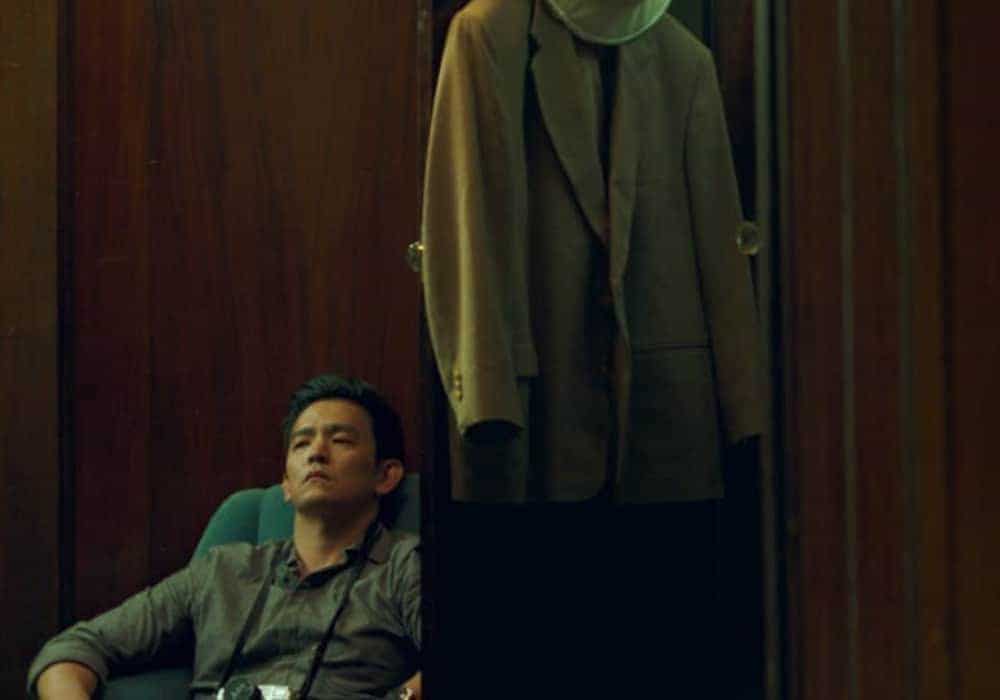
Although 2017 was a turbulent year in news and politics, cinema provided a little solace with performances as varied as they were emotionally engaging, passionate, and entertaining. Highlights ranged from the quiet and contemplative, with John Cho in Columbus, to the intense and aggressive, with Allison Janney in I, Tonya. 2017 also saw the unprecedented success of non-Nicholas Sparks romances with Call Me by Your Name and God’s Own Country, both widely popular with critics and audiences, alike. Call Me by Your Name was one of several excellent coming-of-age stories, which also included Lady Bird. These are my picks, in no particular order, of some of the best performances of the year.
Josh O’Connor in God’s Own Country
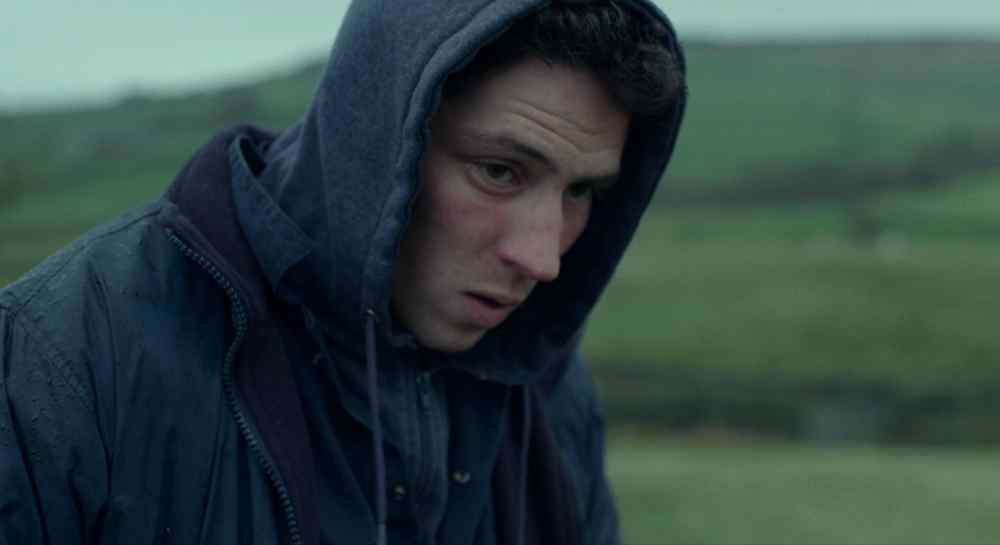
One of the most electrifying performances this year was Josh O’Connor as the emotionally closed Johnny in Francis Lee’s God’s Own Country. The young actor approached his performance very physically, both to accurately portray a Northern English sheep farmer and to illustrate the effects of unexpected kindness on his character. Josh’s performance reminded me of a prisoner I worked with in an outreach theatre production of Waiting for Godot: the prisoner started his rehearsal process slouching angrily, but his body slowly became more upright and open as he gradually gained confidence and found joy in his performance. The same is true for Johnny: when he falls in love with his fellow farmhand Gheorghe (Alec Secareanu), he slowly opens up like a flower in spring.
[clickToTweet tweet=”‘Josh O’Connor’s performance in GOD’S OWN COUNTRY reminded me of a prisoner I worked with in an outreach theatre production.'” quote=”‘Josh O’Connor’s performance in GOD’S OWN COUNTRY reminded me of a prisoner I worked with in an outreach theatre production.'”]
At first, everything in Johnny’s body is rough, aggressive, and tense, from the way he approaches farm work to the way he has sex for physical exertion rather than pleasure. As Gheorghe urges him to take time when making love, or to start taking better care of himself, O’Connor’s body suddenly softens and relaxes. When Johnny visits Gheorghe’s caravan late at night, he slumps down with his arms firmly crossed. Slowly, as Gheorghe begins to delicately touch and kiss Johnny, O’Connor’s face twists with delight, his cheeks turn pink, and his body softens into the couch cushions. By the end of the film, O’Connor has completely changed Johnny’s posture: he now walks a little less gruffly and stands taller. His physical openness reflects that he is more emotionally available to love another person.
Laurie Metcalf in Lady Bird
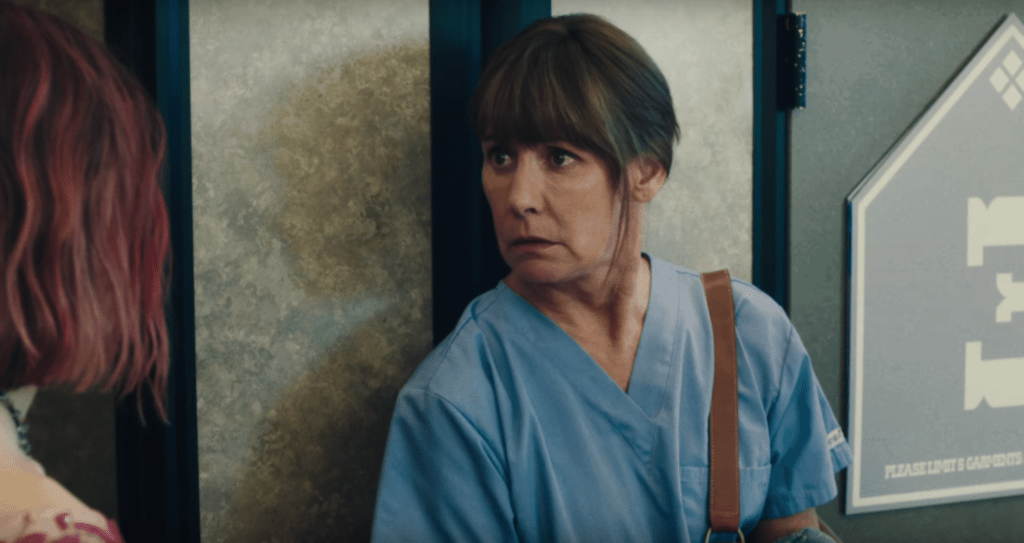
In Greta Gerwig’s film, Laurie Metcalf delivers an emotionally honest and captivating performance as Marion, a mother struggling to provide for her family and to let go of her nearly grown teenage daughter. She expresses her emotions strongly through her face and eyes. From the way she looks sternly at Lady Bird, to the way she laughs joyfully about a joke present she buys at Christmas, her emotions are grounded in reality, and she is openly expressive: when she seems annoyed, it shows on her face, and when she laughs, she does so loudly and her eyes crinkle up. She wears her emotions on her sleeve. Her love for Lady Bird is palpable in every moment, making Metcalf’s character feel immediately familiar.
[clickToTweet tweet=”‘Metcalf’s expressive features can convey a tangle of mixed and complicated feelings, even in silence or when she has no-one to act against.'” quote=”‘Metcalf’s expressive features can convey a tangle of mixed and complicated feelings, even in silence or when she has no-one to act against.'”]
Metcalf’s expressive features can convey a tangle of mixed and complicated feelings, even in silence or when she has no-one to act against. At the end of the film, Gerwig gives us a long take of Marion, by herself in her car instead of at the airport saying goodbye to her daughter who is moving away. Marion is too proud to admit how hard it is to let her daughter go and start university in another city. Her need is buried under the surface. Metcalf’s face is tight, trying not to let anything slip through, her lips pursed to repress the emotions of her character. Soon enough, her lips quiver slightly, and then her buried grief spills out with the welling of her eyes as she runs for the airport entrance to try and say goodbye. But it’s too late: she’s already missed her daughter. This stoic, uptight woman crumbles into her husband’s arms and begins to cry.
Michael Stuhlbarg in Call Me by Your Name
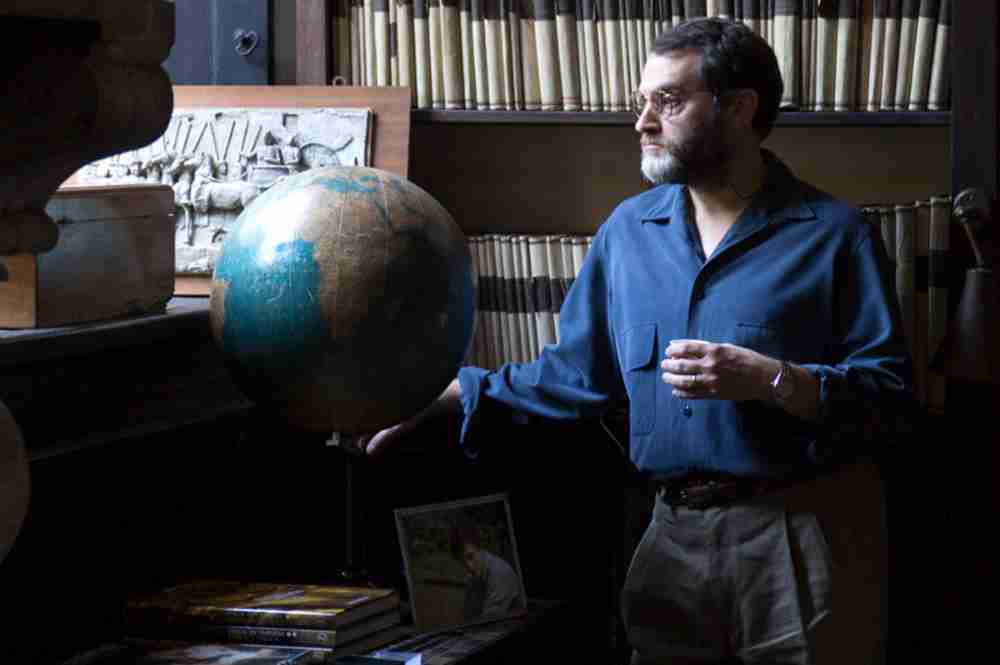
When it came time to cast the father role in Call Me by Your Name, it proved no one wanted the job, according to an interview with screenwriter James Ivory. Luckily, the very talented and underappreciated Michael Stuhlbarg took the role as the passionate and warm professor Mr. Perlman.
Throughout the film, Stuhlbarg’s tone and demeanour is warm and embracing. He welcomes Oliver (Armie Hammer) into his home with an affectionate tone of his voice and an open physicality. He speaks with a buoyant joyful tone as well as embracing Oliver with a hug and wrapping his arms around his shoulders like a father to a son. Also, Stuhlbarg captures Mr. Perlman’s lust for knowledge and love of archaeology. One scene where the audience sees the character’s passion is when he gallops and laughs with excitement as he goes to the shore to witness a ancient statue erupted from the sea. Seeing his joy presented in his body as well as the excitement in his voice brings levity to the scene and to the film.
I wrote about my favourite scene in Call Me by Your Name, the one near the end of the film, in which Mr. Perlman tells his son, Elio (Timothée Chalamet), about his past in order to convey that it is important to be open to the possibilities of love even when it can cause grief. Though the writing and directing within that scene are exceptional, Stuhlbarg shines in this pivotal moment due to his mastery of pacing.
[clickToTweet tweet=”‘Stuhlbarg slowly reveals more and more in his monologue, like someone carefully opening up a delicate package.'” quote=”‘Stuhlbarg slowly reveals more and more in his monologue, like someone carefully opening up a delicate package.'”]
Stuhlbarg slowly reveals more and more in this monologue, like someone carefully opening up a delicate package. Through small physical gestures punctuating his speech, he gives enough space for the audience, and for Elio, to take in the information he is providing, and think of what his often coded words really mean. Instead of simply pausing throughout his speech, he puts out his cigarette, then grabs his glass of whisky, then brushes his hair back, then takes off his glasses, and then gently caresses his son’s head. These pauses give us time to absorb what Mr. Perlman is saying, but Stuhlbarg’s quotidian gestures tone down the potential for melodrama. Stuhlbarg’s voice is even-tempered and soothing, rather than intense or emotional. Stuhlbarg may be performing for us, but Mr. Perlman is giving advice to his only child, making his vulnerability all the more affecting.
Read our Special Issue on Call Me by Your Name here >>
Pei-Pei Cheng in Meditation Park
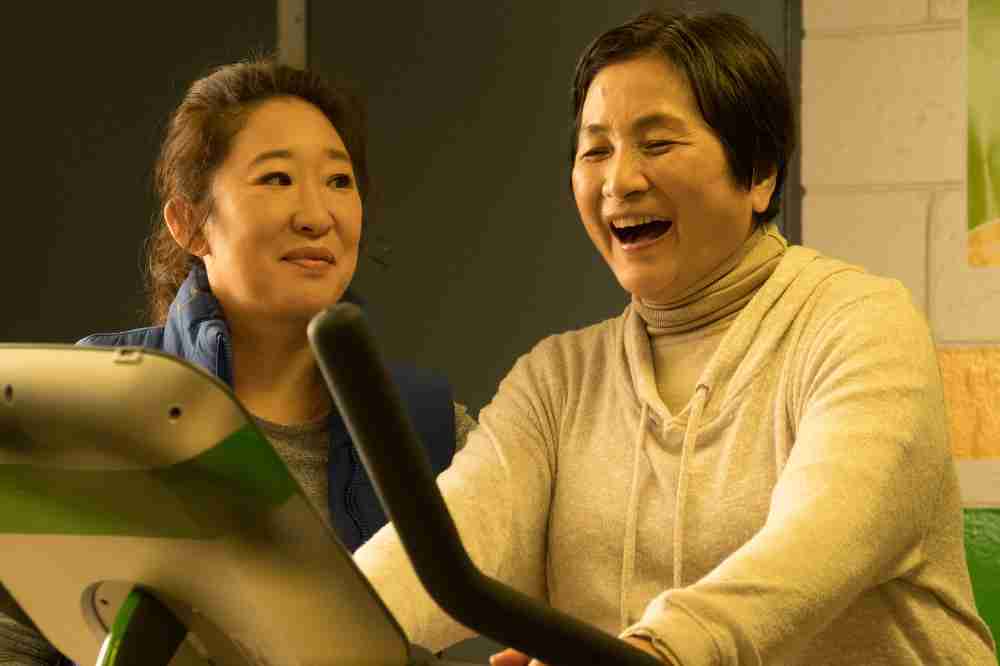
Pei-Pei Cheng’s performance as Maria is an absolute delight, mainly due to the sense of discovery she conveys on her face. Maria is an obedient housewife who has a personal awakening after she discovers her husband is cheating on her. She starts to learn new life skills and have experiences for the first time, like getting a job, and socializing with her neighbours. During these moments of pleasure and personal discovery, Cheng’s face is aglow, and she exudes joy and wonder.
[clickToTweet tweet=”‘Pei-Pei Cheng’s performance in MEDITATION PARK is an absolute delight, mainly due to the sense of discovery she conveys on her face.'” quote=”‘Pei-Pei Cheng’s performance in MEDITATION PARK is an absolute delight, mainly due to the sense of discovery she conveys on her face.'”]
She also has moments of distress and heartache. When Maria stumbles across a pair of her husband’s mistress’ underwear in his trousers, her feelings are written all over her face: her immediate pain is registered through the tightening and shriveling of her face and an almost involuntary groan as Cheng shows how thoroughly Maria has been thrown into turmoil. Cheng’s almost youthful emotional transparency makes the audience share in Maria’s emotional journey of joy, pain, or anguish as we discover her newfound freedom right along with her.
John Cho in Columbus
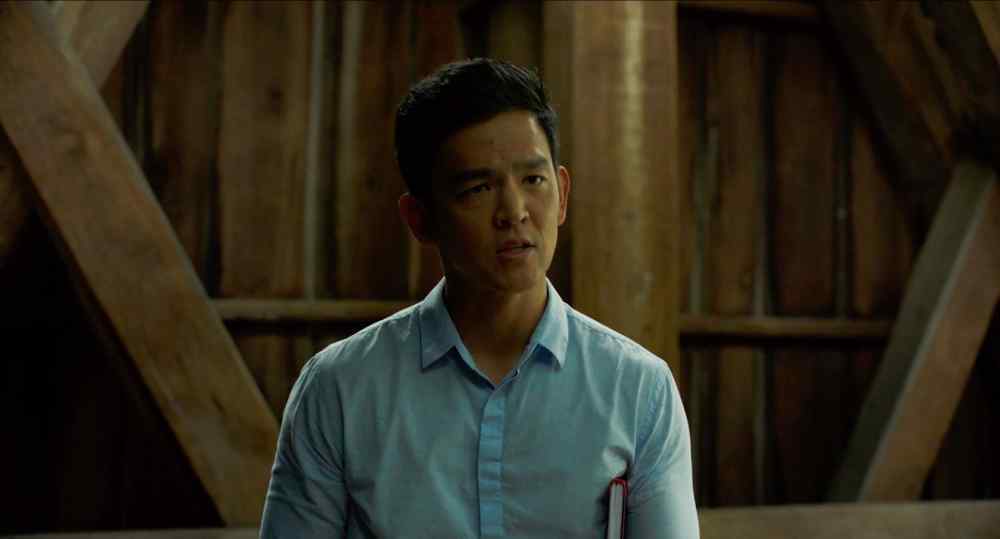
Columbus is a meditative and understated film that serves as a low key star vehicle for John Cho to showcase his patience and stoicism as an actor. Cho plays Jin, a Korean-American who has been living overseas and who is now forced to remain by his father’s bedside in his hometown of Columbus, Indiana, when his father suddenly has a heart attack. While stuck there, Jin befriends Casey (Haley Lu Richardson), a recent high school grad, and the two share their passion in the famous architecture in the city.
Helen Mirren once said, “The hardest challenge for an actor is to simply walk across a stage as themselves”; Cho manages to do this effectively for an entire film. Cho is like a moving statue gliding through the environment; the calm precision of his movements is completely hypnotic. Because director Kogonada is very interested in the terrain and architecture of Columbus there are many wide shots, which mean Cho has to convey the building tension within his whole body. As the film progresses, he moves physically closer and closer to Casey, leaning in or closing the gap of distance, without ever really touching. It’s sensual, but ambiguous: is it or will it become a romantic relationship? It’s captivating to watch.
[clickToTweet tweet=”‘In COLUMBUS, John Cho is like a moving statue gliding through the environment; the calm precision of his movements is completely hypnotic.'” quote=”‘In COLUMBUS, John Cho is like a moving statue gliding through the environment; the calm precision of his movements is completely hypnotic.'”]
Unlike many other performances on my list this year, Cho doesn’t experience a pivotal emotionally charged moment. Jin keeps his emotions buried through stillness and rigidity and Cho only allows them to rise up to the surface when they are most needed. For instance, when he is trying to convince Casey to make something of herself, Jin’s grief and pain over his father’s illness slowly creeps up. Cho’s tone gradually becomes more pointed and aggressive, his breathing heavier, and his eyes tighter. This shift in temperament is very smooth and doesn’t feel like an abrupt change in tension but something that has been building within Cho’s performance throughout the entire film.
Cynthia Nixon in A Quiet Passion
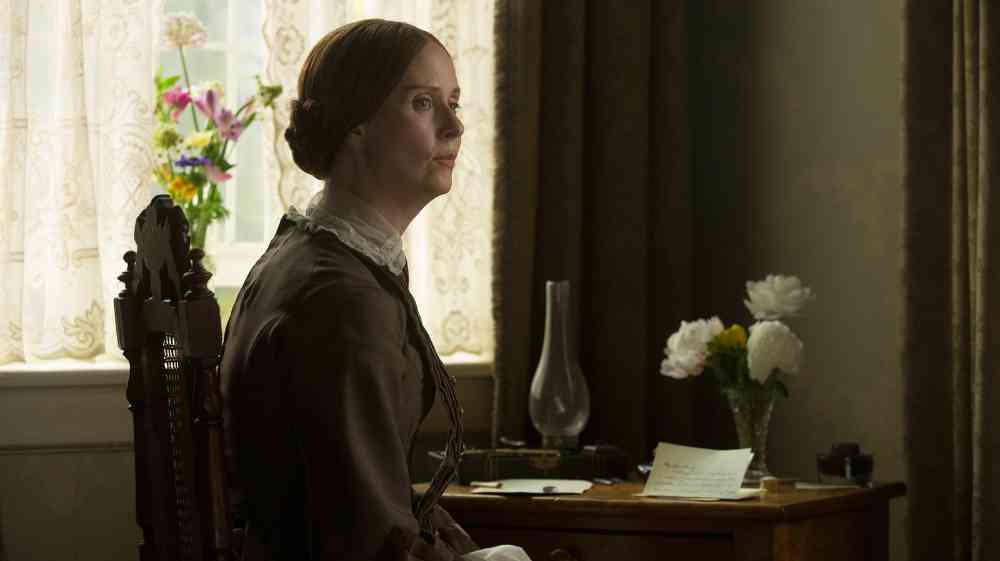
Back in April, I wrote an in-depth analysis of Nixon’s portrayal of Emily Dickinson, and hers still ranks amongst the best performances of the year. Here is a little extract from that article:
Nixon recites Dickinson’s poetry throughout the film in voice-over, which allow her technical skills as a performer to truly shine because she must show Emily’s evolution over the course of the film using just her voice and Dickinson’s poetry. For instance, at the beginning of the film, Nixon delivers each of her poems with shy excitement. This reflects Emily’s early career as a writer, self-conscious but happy. As the film progresses, Nixon’s voice becomes more measured and nuanced because she has grown in confidence as a writer. This mainly has to do with her published works but also being admired for her talents by members of the community. A prime example of this is in Nixon’s reading of “My life closed twice before its close” at the end of the film as Emily’s dead body lies on her bed:
My life closed twice before its close —
It yet remains to see
If immortality unveil
A third event to me
So huge, so hopeless to conceive
As these that twice befell.
Parting is all we know of heaven,
And all we need of hell.
[clickToTweet tweet=”‘As A QUIET PASSION progresses, Cynthia Nixon’s voice becomes more measured and nuanced because she has grown in confidence as a writer.'” quote=”‘As A QUIET PASSION progresses, Cynthia Nixon’s voice becomes more measured and nuanced because she has grown in confidence as a writer.'”]
Nixon recites this poem as if she is saying goodbye to the audience, wanting us to remember Emily for her craft as a writer. She elongates ‘immortality’, ‘hopeless’, and ‘heaven’, which draws the audience into the emotional power and melancholy of the poem. Nixon creates a fully rounded character, physically and emotionally through character mannerisms, and sensually, through the rhythm of her voice, which revives the images in Dickinson’s poetry.

